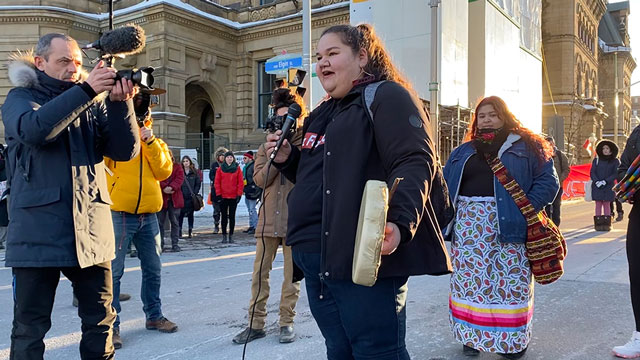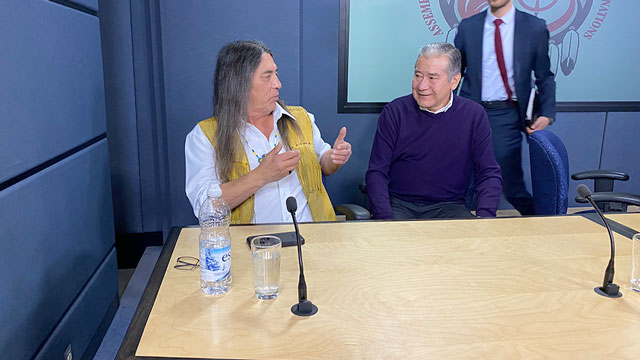First Nations leaders brought a message of peace and calm to a press conference thrown by the Assembly of First Nations (AFN) as MPs returned to Parliament Hill on Tuesday.
There was a debate in the House of Commons about actions that have halted trains, slowed traffic, and disrupted ports from coast to coast.
“We must invoke the message of the peacemaker,” said Elder Mike Mitchell, former grand chief of the Mohawk Council of Akwesasne.
According to oral tradition, peacemaker brought peace to the five warring nations that became the Haudenosaunee, known as the Iroquois Confederacy in English.
“I’m well aware there’s a lot of hatred in this country. It’s directed at First Nations. We’ve got a lot of work to do. We can react, or we can sit down and consult with one another based on that message of peace left by the Peacemaker,” he said.
AFN National Chief Perry Bellegarde also called for calm, creativity, and dialogue.
He said he’s been in contact with numerous parties, including regional, elected, and hereditary chiefs.
“Wet’suwet’en peoples have asked that they be given space for their own internal dialogue and ceremonies to be held,” said Bellegarde.
Soon after, Prime Minister Justin Trudeau stood in the house of commons and gave a speech about the Wet’suwet’en solidarity demonstrations that have disrupted freight and passenger train travel across the country.
The speech reiterated much of what Trudeau said in recent days.
“People are upset and frustrated,” Trudeau said, “because this is about things that matter: rights, livelihoods, the rule of law, and our democracy.”
He reiterated Bellegarde’s call for calm, dialogue, and mutual respect.

Trudeau also delivered a message to the Mohawk and Wet’suwet’en nations.
“We are not asking that they stop standing up for their communities, rights and for what they believe. We only ask that they be willing to work with the federal government as partners in finding solutions,” he said.
“They remind us, rightly so, that too often trust has been betrayed in the history of Indigenous negotiations with Canadian governments. In fact, that underlines the difficulty of solving this situation today, but our common ground is the desire to arrive at solutions.”
Trudeau also responded to comments outgoing Conservative leader Andrew Scheer made on Friday. Scheer told reporters that “radical activists” halting trains need to “check their privilege.” He also said if he was in charge he would direct RCMP to move in and enforce the law.
“There are those who would want us to act in haste, who want us to boil this down to slogans and ignore the complexities, who think that using force is helpful. It is not. Patience may be in short supply and that makes it more valuable than ever,” said Trudeau.
Heckling from MPs on the opposition side interrupted Trudeau at this point. The speaker of the house stepped in to ask for calm, before Trudeau restated his call for patience and finished his speech.
Watch Todd Lamirande’s story on the speeches in the house of commons Tuesday
Andrew Scheer responds
Trudeau’s comments in the house were met with harsh criticism from Scheer.
He derided the address as a “word salad” and the “the weakest response to a national crisis in Canadian history.”
Scheer, who resigned as Tory leader in December, said Trudeau failed to denounce as illegal the “actions of these radical activists” and failed to provide an action plan to get trains back on track.
“The prime minister’s statement was a complete abdication of responsibility and of leadership,” he said.
Scheer’s fellow politicians bristled against these answers. Trudeau excluded Scheer from a briefing on the situation he gave with opposition leaders of the NDP, Bloc Quebecois, and Green Party.
“Mr. Scheer disqualified himself from constructive discussions with his unacceptable speech earlier today,” Trudeau told reporters prior to question period.
“I think what he said was so divisive that it rises to the level of racism,” said NDP leader Jagmeet Singh.
“The way he described people who are frustrated and angry because they don’t have basic human rights – to call them names, to belittle and divide people who are just asking for basic human dignity to me shows something that goes beyond division and divisiveness to, absolutely, racism.”
First Nations leaders and youth also did not receive Scheer’s Friday comments very well.
“I would ask him [Scheer] back what privileges do I have – as a young, queer, Indigenous woman who grew up low-income – over a white, wealthy, cis-straight man?” asked Dani Lanouette, an Anishinaabe woman who spoke with APTN News at a solidarity march in Ottawa on Monday.

About 200 people marched for three hours through the streets of Ottawa, stopping for a round dance on the Rideau Canal before briefly halting traffic outside of the Rideau Centre mall and the Prime Minister’s Office.
“I’ve been fighting for this stuff for almost half my life and I’m only 22 years old,” said Lanouette. “This wasn’t what we wanted generations ago. We shouldn’t have to still be fighting for things that should have already been done through treaties and things like that.”
Mohawk leaders that attended Tuesday’s press conference also reacted.
“The warmongers out there who are quick to pull the pin and throw the bomb should think about what’s happened in the last little while,” said Joseph Norton, grand chief of the Mohawk Council of Kahnawake, in reference to standoffs at Oka and Ipperwash.
Norton encouraged both sides to use restraint.
“Mr. Scheer and those right-wing politicians are always going to come out with that kind of solution – a hard line to everything,” said Serge Simon, grand chief of the Mohawk Council of Kanesatake.
“I’m sure that him and his Conservatives would love to send in the army to prove some kind of parliamentary supremacy over First Nations people.”
He passed a message along to people halting trains.
“You’ve proven that you’re not scared. Don’t let them bait you into doing something that you don’t want to do.”
The latest on the infrastructure disruptions
Demonstrations of solidarity with hereditary chiefs of the Wet’suwet’en Nation erupted across the country when RCMP moved in on Feb.6 dismantling camps and arresting 28 along the Morice West Forest Service Road on unceded territory in northern British Columbia.
Mounties were enforcing an injunction which was handed down Dec. 31. A similar raid happened in January 2019, where 14 were arrested.
Chiefs representing the five clans of the Wet’suwet’en oppose construction of the $6.6-billion Coastal GasLink (CGL) pipeline and assert Aboriginal title to 22,000 square kilometres of territory. The 670-kilometre pipe would carry fracked natural gas from Dawson Creek to Kitimat on the coast, where it would be liquified and shipped to Asian markets.
While hereditary chiefs said the pipeline requires their permission, 20 elected governments have signed Impact Benefit Agreements (IBAs) with the company. These agreements provide jobs, opportunity, and money in exchange for a declaration of support.
At the press conference, Grand Chief Norton said Indigenous peoples relate to these events.
“Our people out here see that, and they see themselves in that. They feel that pain and that anger. They sense it, and they know it, because we’ve seen it happen to ourselves. So we’re prepared to defend ourselves too, and the young people stand up and say, ‘We’re not going to put up with that,’” he said.
People parked a snow plow close to train tracks near Tyendinaga Mohawk Territory. This forced Canadian National Rail (CN) to shut down operations in eastern Canada.
Via Rail runs on CN tracks. Via shut down passenger travel across the country except for two lines. The company said it hopes trains running full trips between Quebec City and Ottawa will resume service on Thursday. The company also said it hopes to resume service on its Toronto-London-Windsor, Toronto-Sarnia, and Toronto-Niagara lines in southwestern Ontario.
As of Tuesday, 532 trains were cancelled and more than 103 000 passengers affected.
Read more:
‘They need to check their privilege’: Scheer calls for police to end demonstrations
Trains remain idle as federal government offers to meet with Tyendinaga Mohawks
Pressure is mounting from industry as well. Many industry leaders called on Trudeau to intervene in an open letter that was sent on Tuesday.
“In addition to disrupting domestic and global supply chains, the blockades undermine Canada’s reputation as a dependable partner in international trade. They also threaten public safety by preventing the distribution of essential products like chlorine for water treatment and propane for heating homes, seniors facilities and farms,” the letter said.
“Each additional day rail lines are disrupted requires three to four days for supply chains to recover. This is why it is imperative that the Government act now to get the Canadian economy moving again.”
The Canadian Federation of Agriculture (CFA) issued a statement calling on Trudeau to end the disruptions. The stoppages could lead to a propane shortage if they continue, the organization said.
“Without access to propane shipments, there is a very real risk of animal welfare issues as many farmers use propane to heat their barns in the winter months.”
CN obtained injunctions to end the demonstrations near Tyendinaga, which is partway between Toronto and Ottawa, and New Hazelton, B.C.
Ontario Provincial Police (OPP) have served the Tyendinaga injunction. They have not yet enforced it.
The New Hazelton site was dismantled voluntarily pending meetings between Gitxsan and Wet’suwet’en hereditary chiefs and the federal government. People continue blocking train tracks on Listuguj First Nation territory in Quebec. People on Kahnawake Mohawk Territory continue blocking a commuter train from entering Montreal.
The way forward?
Mohawks and the government await word from Wet’suwet’en hereditary chiefs.
On Sunday evening, Trudeau cancelled the Barbados leg of an international charm offensive to secure a seat on the United Nations Security Council.
Instead, Trudeau convened the Incident Response Group with various members of his cabinet.
When it was created in 2018, the prime minister’s website called the group “a dedicated, emergency committee” that would convene in the event of a “national crisis.”
Minister of Crown-Indigenous Relations Carolyn Bennett said the government is willing to meet with hereditary chiefs as soon as they extend an invitation to their territory.
She said she spoke with Wet’suwet’en Hereditary Chief Woos on Sunday.
Minister of Indigenous Services Marc Miller met with people on the train tracks near Tyendinaga on Saturday morning. Talks then moved to a community centre. Media were not permitted during this portion of the discussions.
He said “modest progress” was made. But the people there reiterated their demonstration would continue until the RCMP removed themselves from Wet’suwet’en territory.
A contingent of federal police remains on the territory – though most have now left – and the pipeline company has resumed work.

At the press conference, Grand Chief Serge Simon said he pleaded with the demonstrators to consider standing down, if only temporarily.
“Have you made your point yet? Has the government and the industry understood? I think they did.”
He encouraged people halting trains to consider it not as a surrender but a show of good faith. They can always come back, he added.
“The next one might last longer. It might not be the rails. It might be something else, because it’s the only thing that we have, the only weapon that we have to have our rights recognized and affirmed. It’s a damn shame we have to resort to that type of action in a country that wants to reconcile.”
Simon made similar statements on Monday.
They were met with a demonstration outside his band office.









